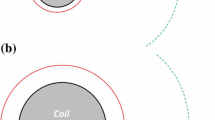Abstract
As modern-day solar cells are made increasingly thin and large, it is very important for the manufacturer to be able to detect cracks in the finished product. When the cells are to be installed in spacecraft or large panel arrays, it is difficult or impossible to replace faulty cells. Small cracks present during manufacturing may not cause significant performance problems immediately; the affected cells may fail at a later time due to thermal cycling or physical shock. Visual, thermal, and infrared methods of inspection have many limitations and often miss detecting cracks. In this paper we present experimental results obtained from eddy-current measurements that were used to infer locations of cracks in solarcells. EMF measurements were made using primarily hand-wound sensors excited by various current sources. The eddy-current measurements indicated conducting traces on the cells and cracks in the material that could be visually verified. Our measurements were made under computer control, using phase-sensitive techniques to measure the amplitude and phase of the induced sensor signal. In some cases, digital enhancement of the images improved the detectability of the cracks.
Access this chapter
Tax calculation will be finalised at checkout
Purchases are for personal use only
Preview
Unable to display preview. Download preview PDF.
Similar content being viewed by others
References
H.L. Libby, “Introduction to Electromagnetic Nondestructive Test Methods,” John Wiley & Sons, Inc., Chapter 2, Chapter 3, (1971).
J.A. Nyenhuis, J.C. Treece, and J.M. Drynan, “Data Acquisition for Experimental Verification of an Eddy Current Model for Three Dimensional Inversion,” IEEE Transactions on Magnetics, MAG-23, #5, pp.3789–3791, 1987.
H.A. Sabbagh and L.D. Sabbagh, “Development of an Eddy-Current Sensor and Algorithm for Three-Dimensional Quantitative Nondestructive Evaluation,” prepared for the DOE, September 1986 SA-TR1–86. This final report has two volumes. The first is an executive summary. The second, subtitled “Signal Conditioning Electronics for Eddy-Current Flaw Detection,” is the thesis of J.C. Treece for the M.S. in Electrical Engineering at Purdue University, and describes the circuit used for signal detection.
A. Rosenfeld and A. Kak, “Digital Picture Processing,” Volume I & II, Academic Press, 1982.
T. Pavlidis, “Algorithms for Graphics and Image Processing,” Computer Science Press, 1982.
Author information
Authors and Affiliations
Editor information
Editors and Affiliations
Rights and permissions
Copyright information
© 1989 Springer Science+Business Media New York
About this chapter
Cite this chapter
Treece, J.C., Shamee, B.F. (1989). Detecting Cracks in Semiconductor Solarcells from Eddy-Current Measurements. In: Thompson, D.O., Chimenti, D.E. (eds) Review of Progress in Quantitative Nondestructive Evaluation. Springer, Boston, MA. https://doi.org/10.1007/978-1-4613-0817-1_160
Download citation
DOI: https://doi.org/10.1007/978-1-4613-0817-1_160
Publisher Name: Springer, Boston, MA
Print ISBN: 978-1-4612-8097-2
Online ISBN: 978-1-4613-0817-1
eBook Packages: Springer Book Archive




